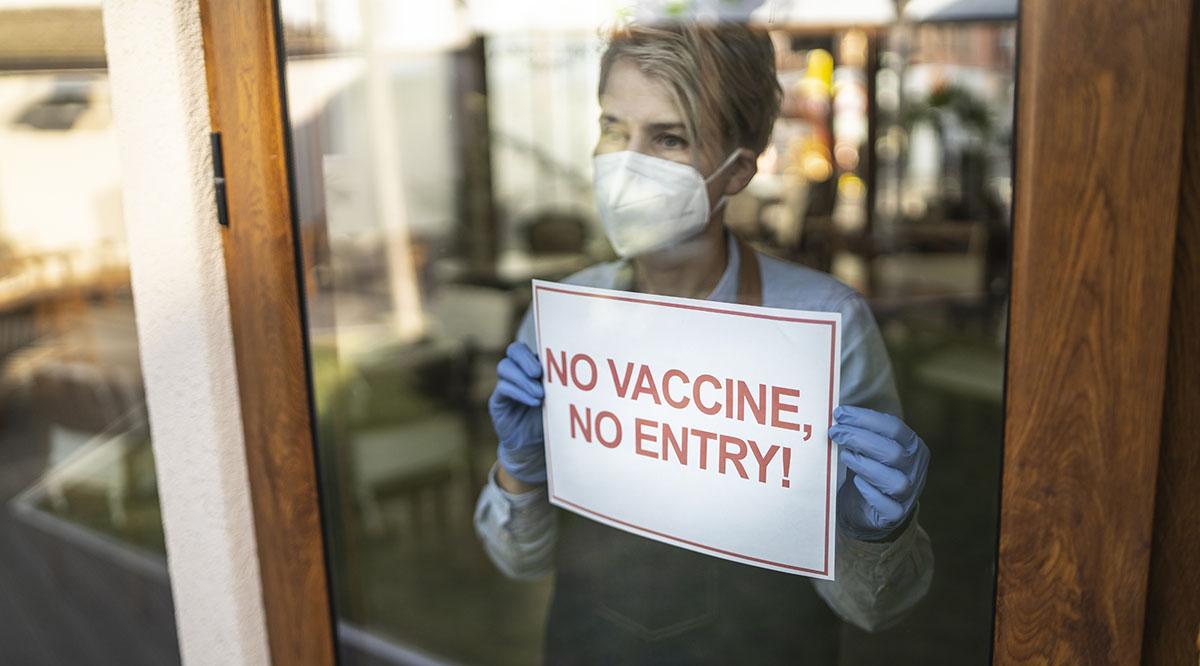Despite the quick approval of safe, highly effective COVID-19 vaccines, vaccination rates in the United States have stagnated over the past few months — with just 69% of adults fully vaccinated as of mid-October.
Now, a growing number of employers, governments, and private businesses are requiring vaccination as a condition of employment, imposing financial penalties for those who remain unvaccinated, and excluding unvaccinated individuals from being able to go to restaurants, gyms, concerts, and other large gatherings.
In August, New York City issued a proof of vaccination mandate for employees and customers at the city’s bars, restaurants, gyms, and entertainment venues. San Francisco and Los Angeles have since followed suit.
Delta Air Lines announced in August that it would increase insurance premiums by $200 a month for employees who remained unvaccinated after Nov. 1. One Colorado health system removed unvaccinated people from organ transplant lists for noncompliance.
And many large employers, including Google, Facebook, United Airlines, Tyson Foods, as well as the federal government, have also issued vaccine mandates.
President Joe Biden said on Oct. 13 that recent vaccine mandates put in place by major employers had pushed those companies’ vaccination rates up by more than 20 percentage points. Even so, 66 million eligible Americans remained unvaccinated.
And that raises the question: Will penalties push the millions of people still unvaccinated to get their shots?
AAMCNews spoke with experts in social psychology, behavioral economics, and medical ethics about what they expect to see as more penalties roll out in the coming weeks.
The stick is more powerful than the carrot
In the spring and summer, to boost the lagging vaccination rate, 19 states announced cash prize lotteries for people who received a COVID-19 vaccine. This incentive was ineffective, according to the findings of a study published in JAMA this month. The researchers compared vaccination rates in the states that offered lotteries to states that didn’t during the same time period and found no noticeable difference.
In fact, offering an incentive might have sent the opposite message than was intended, according to Julie Downs, PhD, a social psychologist and associate professor at Carnegie Mellon University in Pittsburgh.
People might think, “Are you paying me to get vaccinated because it’s something onerous to get vaccinated?” Downs says. “‘Do you have to pay me because it’s super risky?”
She adds that penalties could send the same message.
However, the higher the cost becomes to remain unvaccinated, the more likely it is people will give in and get vaccinated.
“If they’re doing a cost-benefit calculation, they will respond when the cost gets high enough,” Downs says.
“There comes a point where these incentives [are getting] higher and higher and higher until people just can’t afford to not get the vaccine. It does work, but it comes at a cost.”
Julie Downs, PhD
Social psychologist at Carnegie Mellon University
Sure enough, Delta Air Lines got its employee vaccination rate up to 90% after announcing the $200 monthly surcharge for unvaccinated employees. And United Airlines, which requires all employees to be vaccinated, reached a 99% vaccination rate and lost only 1% of its workforce to noncompliance.
“You can think about a mandate as the strongest form of incentive,” says Kevin Volpp, MD, PhD, director of the Center for Health Incentives and Behavioral Economics at the University of Pennsylvania. “What we’ve seen so far in employer settings where there is a mandate related to keeping your job is that very few employees have not complied.”
Dig in their heels
Though the threat of job loss is proving effective in incentivizing most employees to get vaccinated, another likely outcome is further alienating those already firmly against the vaccines.
“As the pool of unvaccinated people gets smaller … the people who are [still unvaccinated are] really heels dug in against vaccination,” Downs says.
“Once you hold one belief in your mind, you want your other beliefs to be consistent with this,” she adds, explaining that this psychological phenomenon can make such people vulnerable to misinformation that further entrenches their beliefs about vaccination.
“There comes a point where these incentives [are getting] higher and higher and higher until people just can’t afford to not get the vaccine,” Downs says. “It does work, but it comes at a cost … [and it’s] very hard in this political environment.”
The federal government and employers that seek to enforce a vaccine mandate will certainly face blowback. Texas Governor Greg Abbott issued an executive order banning any entity from requiring COVID-19 vaccinations for someone who objects for personal conscience, religious, or medical reasons, including prior COVID-19 infection. And the attorneys general of 24 states have signed a letter to President Biden objecting to the new Occupational Safety and Health Administration rules and threatening to sue, saying it will “further drive skepticism” and “strain an already-too-tight labor market.”
“Science and data are not sufficient to influence rational behavior. Behavioral economics research has found a number of ways to predictably influence behavior in ways that are not always rational.”
Daniel Polsky, PhD
Economist and Bloomberg distinguished professor at the Johns Hopkins Bloomberg School of Public Health and Carey Business School
A very small number of people have resisted vaccine mandates. ESPN reporter Allison Williams recently made headlines for giving up her job because she refused to get vaccinated. Kyrie Irving, a professional basketball player for the New York Nets, is not allowed to practice or play with his team because of his vaccination status. And Northwell Health, New York State’s largest health care provider, fired 1,400 workers who refused to get vaccinated by the September deadline, Forbes reported.
“Science and data are not sufficient to influence rational behavior. Behavioral economics research has found a number of ways to predictably influence behavior in ways that are not always rational,” says Daniel Polsky, PhD, an economist and Bloomberg distinguished professor at the Johns Hopkins Bloomberg School of Public Health and Carey Business School. “For example, the behavior of those around you can have more influence on decision making than science and data.”
Employment-based mandates can be effective, but employers must be willing to follow through on them, even if that means losing workers.
“There are people who are willing to be fired and that creates a difficult situation,” he says. “I don’t think employers are wanting to get rid of people.”
Potential for equity issues
Faith Fletcher, PhD, an assistant professor at the Center for Medical Ethics and Health Policy at Baylor College of Medicine, says that mass vaccination efforts are critical to reducing the spread of COVID-19, but worries about what she sees as the ethical implications of fear-based public health campaigns.
“The overemphasis on fear and disincentives can really lead to stigma, marginalizing populations that are already marginalized,” Fletcher says.
While racial disparities in vaccinations have gotten smaller in recent months, it remains true that Black and Hispanic people are vaccinated at lower rates than White people, according to an October Kaiser Family Foundation (KFF) analysis of data from the Centers for Disease Control and Prevention (CDC). In 43 states analyzed, the percentage of White people to have received at least one COVID-19 shot was 1.2 times higher than the rate for Black people and 1.1 times higher than for Hispanic people. An earlier KFF poll published in June found that unvaccinated people were more likely to be younger, less educated, Republican, people of color, and uninsured.
“The overemphasis on fear and disincentives can really lead to stigma, marginalizing populations that are already marginalized.”
Faith Fletcher, PhD
Assistant professor at the Center for Medical Ethics and Health Policy at Baylor College of Medicine
“I listen to people who have strong feelings against getting vaccinated, [and often] these feelings are rooted in structural racism in health care and research injustices,” Fletcher says. “We know there is a foundation — not just historical but also contemporary, day-to-day — of injustices in the health care system. … People see those things and it’s hard to separate the vaccine from these other societal injustices.”
Polsky adds that, while incentives and penalties can be used to encourage people to get vaccinated, the penalty should never extend to whether a person receives medical care or insurance coverage. Health care coverage should not be decided based on whether it is perceived that the person is at fault for their ailment, he says.
“[For example,] we have this obesity crisis and some people would say, ‘Maybe we shouldn’t pay for care, it’s the person’s fault for being obese or for being an addict. If someone got sick from COVID — we should withhold paying for care.’… That is a slippery slope and not somewhere we should go.”
When possible, it’s best to try to convince an unvaccinated person of the intrinsic benefits of vaccination, including the fact that it significantly reduces the chance of hospitalization and death from COVID-19. A new study from the CDC found that unvaccinated individuals are 10 times more likely to be hospitalized and 11 times more likely to die from COVID-19 than fully immunized people.
“The thing that moves the vaccine hesitant the most is trust, getting messages from trusted sources,” Polsky says. “Getting the message from your physician or pastor.”
“Not just the messengers themselves, but the way it is delivered,” Downs adds. “With trust and respect.”

